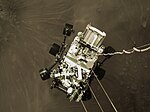HD 108236
| Observation data Epoch J2000 Equinox J2000 | |
|---|---|
| Constellation | Centaurus |
| Right ascension | 12h 26m 17.8916s[1] |
| Declination | −51° 21′ 46.2141″[1] |
| Apparent magnitude (V) | 9.24 |
| Characteristics | |
| Evolutionary stage | main-sequence star |
| Spectral type | G5V |
| Astrometry | |
| Radial velocity (Rv) | 16.78±0.22[2] km/s |
| Proper motion (μ) | RA: −70.627[2] mas/yr Dec.: −49.758[2] mas/yr |
| Parallax (π) | 15.4861 ± 0.0127 mas[2] |
| Distance | 210.6 ± 0.2 ly (64.57 ± 0.05 pc) |
| Details[3] | |
| Mass | 0.867+0.047 −0.046 M☉ |
| Radius | 0.876±0.007 R☉ |
| Luminosity | 0.707±0.032 L☉ |
| Surface gravity (log g) | 4.49±0.11 cgs |
| Temperature | 5660±61 K |
| Metallicity [Fe/H] | −0.28±0.04 dex |
| Age | 6.7+3.3 −3.4 Gyr |
| Other designations | |
| Database references | |
| SIMBAD | data |
HD 108236 is a G-type main-sequence star. Its surface temperature is 5660±61 K. HD 108236 is severely depleted in heavy elements compared to the Sun, with a metallicity Fe/H index of −0.28±0.04 (52% of the Solar System), and is probably older than the Sun at an age of 6.7+3.3
−3.4 billion years.[3]
According to WISE mission data, the star was suspected to be surrounded by a debris disk, but a reanalysis of the data rejected the debris disk hypothesis by 2014.[4] The reason for the false positive was contamination from a nearby infrared source.[5]
Planetary system
[edit]
In 2020, four planets orbiting HD 108236 were discovered[6] by the transit method, followed by another one in 2021.[7]
| Companion (in order from star) | Mass | Semimajor axis (AU) | Orbital period (days) | Eccentricity | Inclination | Radius |
|---|---|---|---|---|---|---|
| b | 4.23+0.41 −0.39 M🜨 | 0.0451±0.0004 | 3.7958785+0.0000076 −0.0000070 | 0.067+0.025 −0.026 | 88.23±0.32° | 1.587±0.028 R🜨 |
| c | 8.90+0.67 −0.64 M🜨 | 0.0626±0.0006 | 6.2036717+0.0000092 −0.0000100 | 0.091+0.021 −0.033 | 88.8±0.2° | 2.122±0.025 R🜨 |
| d | 7.75+0.91 −0.62 M🜨 | 0.1087±0.0010 | 14.175818+0.000024 −0.000023 | 0.075+0.021 −0.022 | 88.8±0.1° | 2.629±0.031 R🜨 |
| e | 8.2+3.8 −1.2 M🜨 | 0.1348±0.0012 | 19.5901277±0.000030 | 0.073+0.014 −0.017 | 89.3±0.1° | 3.008±0.032 R🜨 |
| f | 3.95+0.46 −0.32 M🜨 | 0.1773±0.0016 | 29.53935+0.00012 −0.00014 | 0.024+0.024 −0.016 | 89.07±0.03° | 1.89±0.04 R🜨 |
See also
[edit]- List of exoplanets discovered in 2020 - HD 108236 b through e
- List of exoplanets discovered in 2021 - HD 108236 f
References
[edit]- ^ a b c "HD 108236". SIMBAD. Centre de données astronomiques de Strasbourg. Retrieved 2021-01-17.
- ^ a b c d Brown, A. G. A.; et al. (Gaia collaboration) (2021). "Gaia Early Data Release 3: Summary of the contents and survey properties". Astronomy & Astrophysics. 649: A1. arXiv:2012.01533. Bibcode:2021A&A...649A...1G. doi:10.1051/0004-6361/202039657. S2CID 227254300. (Erratum: doi:10.1051/0004-6361/202039657e). Gaia EDR3 record for this source at VizieR.
- ^ a b c Hoyer, S.; et al. (2022), "Characterization of the HD 108236 system with CHEOPS and TESS Confirmation of a fifth transiting planet", Astronomy & Astrophysics, 668: A117, arXiv:2210.08912, Bibcode:2022A&A...668A.117H, doi:10.1051/0004-6361/202243720, S2CID 252832042
- ^ Patel, Rahul I.; Metchev, Stanimir A.; Heinze, Aren (2014), "A Sensitive Identification of Warm Debris Disks in the Solar Neighborhood Through Precise Calibration of Saturated Wise Photometry", The Astrophysical Journal Supplement Series, 212 (1): 10, arXiv:1403.3435, Bibcode:2014ApJS..212...10P, doi:10.1088/0067-0049/212/1/10, S2CID 119219094
- ^ Patel, Rahul I.; Metchev, Stanimir A.; Heinze, Aren; Trollo, Joseph (2016), "The Faintest WISE debris Disks: Enhanced Methods for Detection and Verification", The Astronomical Journal, 153 (2): 54, arXiv:1612.04818, Bibcode:2017AJ....153...54P, doi:10.3847/1538-3881/153/2/54, S2CID 3006490
- ^ Daylan, Tansu; Pingle, Kartik; Wright, Jasmine; Guenther, Maximilian N.; Stassun, Keivan G.; Kane, Stephen R.; Vanderburg, Andrew; Jontof-Hutter, Daniel; Rodriguez, Joseph E.; Shporer, Avi; Huang, Chelsea; Mikal-Evans, Tom; Badenas-Agusti, Mariona; Collins, Karen A.; Rackham, Benjamin; Quinn, Sam; Cloutier, Ryan; Collins, Kevin I.; Guerra, Pere; Jensen, Eric L. N.; Kielkopf, John F.; Massey, Bob; Schwarz, Richard P.; Charbonneau, David; Lissauer, Jack J.; Irwin, Jonathan M.; Basturk, Ozgur; Fulton, Benjamin; Soubkiou, Abderahmane; et al. (2021). "TESS Discovery of a Super-Earth and Three Sub-Neptunes Hosted by the Bright, Sun-like Star HD 108236". The Astronomical Journal. 161 (2): 85. arXiv:2004.11314. Bibcode:2021AJ....161...85D. doi:10.3847/1538-3881/abd73e. S2CID 216080635.
- ^ a b Bonfanti, A.; Delrez, L.; Hooton, M. J.; Wilson, T. G.; Fossati, L.; Alibert, Y.; Hoyer, S.; Mustill, A. J.; Osborn, H. P.; Adibekyan, V.; Gandolfi, D.; Salmon, S.; Sousa, S. G.; Tuson, A.; Van Grootel, V.; Cabrera, J.; Nascimbeni, V.; Maxted, P. F. L.; Barros, S. C. C.; Billot, N.; Bonfils, X.; Borsato, L.; Broeg, C.; Davies, M. B.; Deleuil, M.; Demangeon, O. D. S.; Fridlund, M.; Lacedelli, G.; Lendl, M.; et al. (2021). "CHEOPS observations of the HD 108236 planetary system: A fifth planet, improved ephemerides, and planetary radii". Astronomy & Astrophysics. 646: A157. arXiv:2101.00663. Bibcode:2021A&A...646A.157B. doi:10.1051/0004-6361/202039608. S2CID 230437723.


 French
French Deutsch
Deutsch

